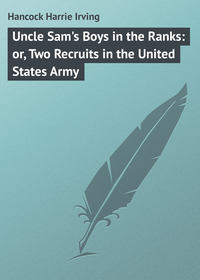 полная версия
полная версияThe Motor Boat Club off Long Island: or, A Daring Marine Game at Racing Speed
When that food had been disposed of, Joe cautiously worked the engine on until the boat was making twenty miles an hour. The new valve proved fully equal to the strain put upon it.
Mr. Moddridge remained below more than two hours. When he came on deck again he appeared to be in shape to tell Mr. Delavan the latest news he had of the state of their affairs.
The owner listened with a face that became graver every moment.
“It looks black for us, Eben, and we may be wiped out by this time, or, anyway, by the time we can get back to the battle-field. But it was grand of you, Eb, to throw in the last dollars of your private fortune to save us both. Whatever happens, I won’t forget your act. But, good heavens, how we must hustle and move now! Captain Halstead, just where are you heading?”
“As straight as the crow flies, sir, for New York harbor. But I can change the course if there’s any other point you’d rather make.”
“No; keep straight on, captain. New York is our battle-field. And, by all that’s sure, we’ll win out yet if there’s a fighting spar left standing when we hit Wall Street!”
With a vigorous bound this fighting Wall Street man was on his feet again, pacing the deck, not a glimpse of fear in his strong face.
Then, a little later, he and Moddridge found their appetites, and Hank Butts served them enthusiastically.
As the afternoon passed, and all hands gathered near the wheel, the stories of all were told.
Mr. Delavan, for his part, explained that, on that morning when he had taken the “Rocket’s” port boat and had gone out for a row, he had gone past the inlet. While out beyond, he had been overtaken by the nameless racing launch. A hail from the deck of the other craft had followed, and then an invitation to take a look aboard. Thinking that he might possibly penetrate the mystery as to who was really running that craft, Mr. Delavan had rowed alongside, intending only to stand up in his own little boat and look aboard the launch.
But, while doing so, he had been seized by both the boat handlers and dragged aboard. There he became mixed in a fight with two others who, from their descriptions, must have been Rexford and Ellis. When the fight stopped Francis Delavan was under the hood, his hands tied behind him. He remembered that, later on, the small port boat had been overturned and set adrift, and that his own hat and coat had been taken from him and cast into the water.
“Later, that forenoon,” continued Mr. Delavan, “I saw my own ‘Rocket’ following us. By stealth I had succeeded in freeing my hands. Now, I made a dash for freedom, intending to leap overboard and try to swim to you. But I was caught and held, just at the edge of the hood. I found chance only to snatch my wallet from an inner vest pocket and hurl it out into the water. I was in hopes you’d see it, pick it up, and understand.”
“We did,” nodded Mr. Moddridge.
Mr. Delavan went on to explain how, after the throwing of the wallet, he had been more carefully bound, hand and foot, and gagged. When taken ashore at Cookson’s Inlet he had also been blindfolded, his removal from the boat not taking place until a carriage had been brought.
Then the story of the final chase was told, even how Hank Butts had done so much to carry the day aboard the schooner by his artless trick of dropping the hitching weight where it would do the most harm to the enemy.
“Say, Hank,” put in Joe Dawson, who had taken little part in the talk, “wherever did you learn the easy way that you drop that weight?”
“A feller from New York taught us that last summer,” Butts replied. “Some of us fellows over in East Hampton practiced it until we couldn’t miss.”
“But how did you learn to land it on another fellow’s foot so easily that it looks almost like an accident?”
“I’ve been telling you,” Hank insisted. “We kept on dropping weights on each other’s toes until we got the trick down fine.”
“What?” ejaculated Dawson, opening his eyes wider. “You practised by dropping iron weights on each other’s feet? You fellows must be wonders, if you could stand that!”
“Oh, no,” Hank confessed. “We practised with small sandbags.”
CHAPTER XX
THE COUNCIL OF WAR
IT was Saturday morning when the “Rocket’s” crew boarded the schooner out on the high seas. Late Sunday evening the motor boat moved in through the Narrows of lower New York Bay. The cruise had been at racing speed, without a single hitch after Engineer Joe had fitted that new valve.
On the way Francis Delavan, who had thoroughly recovered, formed his plans in case his fortunes had not gone entirely to smash in Wall Street. But it was still needful to consult Broker Coggswell and others, in order to learn just how far the plans were likely to succeed.
As the “Rocket” was intended, in ordinary times, to be a “one-man” boat – that is, to be handled from the bridge by the helmsman, the three members of the crew had managed to divide up the watches so that all had had plenty of sleep.
As Captain Tom dropped anchor at ten o’clock that August Sunday night, near Bedloe’s Island, and Hank hung out the anchor light, all three of the boys were wide awake and eager to see what was to follow.
Hank was to row Mr. Delavan ashore in the same little port boat that had figured in the Shinnecock Bay affair. The owner intended going to one of the cheapest of the downtown hotels, whence he would telephone Broker Coggswell and some others.
“Expect a party of us back by midnight,” was the last word the owner left with the young skipper. “We’ll want a little cruise out to sea, to-night, where we can talk things over with no danger of any eavesdroppers about.”
Mr. Moddridge and the two remaining members of the crew stretched themselves out comfortably in arm-chairs on the bridge deck.
“It’s hard to realize that we can rest,” sighed Captain Tom. “It seems to me that I still hear the throb-throb-throb of the engine and hear the continual turning of the propeller shaft. Still, we really are having a brief rest.”
“Rest?” snorted Eben Moddridge, getting up and pacing within the short limits of that deck. “What does rest mean, I wonder? I feel as though this Wall Street game I’m in had been going on, night and day, for ten years, with never a pause for breath. Rest! Is there such a thing?”
A few days before Halstead would have been either amused or bored by this exhibition of nervousness. But he had seen Mr. Moddridge come out with surprising strength when things had been darker. There was a good deal of hidden manhood in this undersized, nervous little fellow who had had the hard luck to be born with too much money.
“You can feel pretty easy, sir, with a man like Mr. Delavan,” Captain Tom went on, after a few moments. “If there’s a single foot of ground left for him to fight on, you can feel pretty sure that he’ll pull at least a goodly portion of both your fortunes out of the panic that has struck the money market.”
“I can hardly believe that we have a dollar left in the game,” rejoined Mr. Moddridge, shaking his head moodily. “Of course, Coggswell is capable and honest, and he has done his best, whatever that was. But with such a terrific run on P. & Y. stock, and with such an overwhelming part of our assets bound up in that stock, I haven’t the least belief that Coggswell has been able to hold our heads above water for us. This long suspense, this awful wait for news, is killing me,” went on the nervous one, sinking weakly back into his chair. “Oh, why didn’t I go ashore with Frank, the sooner to know how we stand?”
“Mr. Delavan thought it would be better for him to go alone, and to move quickly,” hinted Tom Halstead, gently.
“Oh, yes, I know,” retorted Moddridge, with a sickly smile. “Frank was certain that my nerves would go to pieces on shore, and that I’d make a fool of myself and be in the way.”
Hank came back at last, alone in the port boat.
“What’s the news ashore, Butts?” cried the nervous one, anxiously.
“If you mean the stock market news,” Hank replied, as he brought the port boat around under the davits, “I don’t know. Mr. Delavan left me at the pier where I landed him. Told me he’d get a launch to bring his friends out here in.”
So Mr. Moddridge took to another long stretch of pacing the bridge deck.
Almost punctually as the “Rocket’s” ship’s bell tolled out the eight bells of midnight the lights of a small launch were to be seen approaching. It came alongside, bringing Mr. Delavan and three other gentlemen. One was Coggswell, the broker. A second was Lyman Johnson, a middle-aged man and managing vice-president of the P. & Y. The third stranger was a banker named Oliver.
“What news?” was the quaking question that Eben Moddridge shot over the waters as soon as the little craft was within hail.
“Things right down to the bottom,” replied Broker Coggswell, plainly.
“But there’s a fighting chance, Eb,” broke in Francis Delavan, “and a chance to fight is all I want for winning.”
As soon as the party had boarded, and the launch was speeding back to town, Mr. Moddridge began to shake again.
“Look at that little boat scoot,” he shivered. “That boatman is going back as fast as he can, to trade the information he has overheard.”
“Nonsense,” laughed Mr. Delavan. “A passenger boatman like that fellow hears all kinds of talk in twenty-four hours. If he tried to remember a hundredth part of what he hears it would drive him into an insane asylum. Captain Halstead, get up anchor and take us outside, anywhere. We’re going to sit up and talk for a while. Then we’ll turn in below and sleep. We don’t want to berth the boat in New York earlier than eight in the morning, but must be there sharp at that hour.”
Tired of the motion of the boat so long at racing speed. Captain Tom got under way at a speed of about eight miles an hour. The newcomers and Mr. Moddridge sat in a close group on the bridge deck, to hold their council of war for the morrow.
“In the first place, Moddridge,” began Mr. Coggswell, “P. & Y. closed yesterday noon, on the Stock Exchange, at 68.”
“We must be closed out, then – ruined!” cried the nervous one, aghast. “You figured, you know, that the stock touching 71 would wind us up.”
“And so it would have done,” replied the broker, “but Steel and the other stocks that are traveling with it behaved rather better than I had expected. So, as things stand to-night you and Delavan have, perhaps, a few hundred thousand dollars left out of the game. But if P. & Y., at the opening on the Board to-morrow, goes down to 65 – well, Oliver, as the head of the bankers’ syndicate that has been furnishing money to the Delavan-Moddridge interests, suppose you tell what must happen.”
“If the stock drops to 65 to-morrow morning,” took up the banker, “our pool will have to call in the loans, Mr. Moddridge. Delavan and yourself will have to heave all your P. & Y. stock overboard in order to meet the call of the loans. Then, but not until then, as I understand Mr. Coggswell’s statement, you will both be cleaned out.”
“But that isn’t going to happen,” declared Francis Delavan, coolly lighting a fresh cigar and puffing slowly. “There have, of course, been all sorts of stories out that I’ve been robbing the P. & Y. railroad and that I’ve smuggled the money out of the country. But Johnson, our vice president, has had a firm of the most respected and trusted accountants in New York going over all the railroad’s accounts. By to-morrow forenoon the reports of the accountants will be ready, and will show that every dollar of the P. & Y.’s money is safe.”
“That will help,” replied Mr. Coggswell, “if the buying and selling public believe the statement at once. But you never can tell how small dealers in stocks will accept any report. They may think the move only a trick to bolster up confidence until the inside operators can slip out of their holdings in P. & Y. If that view is taken, the stock may fall off a dozen points in the first half hour that ’Change is open.”
“It can all be summed up in these words,” announced Banker Oliver, gravely. “Delavan, start P. & Y. going up in the morning, and you’re safe for a while, with a big chance for fortune left. But let the stock start downward at the opening to-morrow morning, and you won’t be able to get the stock up again in season to do you any good.”
Breathing hard, shaking all over, Eben Moddridge rose and left the council, tottering below and seeking his berth.
“Now that the poor, shaken fellow is gone,” murmured Francis Delavan, sending a sympathetic glance in the direction his friend had taken, “I’ll tell you, gentlemen, the plan I have for to-morrow.”
The council did not break up until an hour later.
CHAPTER XXI
THE BATTLE OF THE DOLLARS
ALMOST at the minute of eight o’clock next morning the “Rocket” was made fast in berth at an East River pier.
Just about three minutes later a closed automobile rolled out on the wharf. Tom Halstead and Joe Dawson had been invited to go on shore and see the finish of this notable battle of the dollars. Hank, of his own choice, remained behind as watchman over the boat.
The two motor boat boys had changed their uniforms for ordinary street dress, straw hats included. It would have taken a very close friend, indeed, to have recognized Francis Delavan as that gentleman stepped ashore from his boat. Over his natty suit he wore an enveloping linen duster. His eyes and much of his face were obscured behind a pair of automobile goggles. A cap, the peak pulled well down over his eyes, completed the concealment. Few of Mr. Delavan’s most intimate friends would have known him at first or second glance.
The employer and his two young men entered the closed car, which, first of all, rolled away to the bank of which Mr. Oliver was president. Here there were some papers that required the signature of the “Rocket’s” owner.
From the bank the automobile went straight down to the big, grim-looking building in which the New York Stock Exchange is located. Here they arrived five minutes before the opening hour, nine o’clock. Mr. Delavan was already provided with three tickets admitting strangers to the visitors’ gallery.
As they entered the trio found that, at this hour, they had the gallery to themselves. Down on the floor, however, some two or three hundred members of ’Change were already present, gathered in little groups. Though these men talked mostly in undertones, it was evident that there was much excitement.
P. & Y. had not alone suffered. Many other stocks had gone down, “in sympathy.” The outlook was for a gloomy week in financial circles. Many of the more cautious investors of the country at large were watching Wall Street and dreading a panic.
Clang! As a sonorous stroke of a gong opened the morning session the scene became instantly one of turmoil. Bellowing voices broke loose. At that instant Broker Coggswell slipped into the gallery, taking a seat behind Mr. Delavan. The entire little party was well out of range of vision from most of the floor.
“Watch the board,” whispered the broker. “There’s the first quotation – a thousand shares of P. & Y. at 67 – and, by Jove, no taker!”
A few moments later information was posted that ten thousand shares of P. & Y. had been offered and sold at 66.
“That’s the work of Dimitri & Clark, and Weeks & Bond,” whispered Coggswell. “My partner has sent me word that those two firms are doing the selling for Justin Bolton. He’ll sell, through his brokers, a hundred thousand shares short in the next hour, if need be, to keep the downward course of the stock in motion. Ah, what did I tell you?”
Ten thousand more shares of P. & Y. had gone at 65½.
“He’s a reckless bear, that fellow, Bolton!” ground out Coggswell, between his teeth. “He’s selling short at a furious rate. Mr. Delavan, your enemy, Bolton, expects to close your interests out this forenoon. If he can bear the stock low enough he’ll begin to buy in for his own account, as well as to cover his sales. If he can only keep this going for a while he’ll control the P. & Y. through his bona-fide buyings of the stock.”
Francis Delavan merely smiled, and Tom Halstead, looking covertly at him, admired the difference between his employer and Eben Moddridge.
A “bear” is one who is trying to lower the selling price of a stock. Often, in order to accomplish this, the “bear” “sells short.” That is, he offers to sell large blocks of the stock in question, at a lower figure than the market price. This “short operator,” as he is called, does not actually own the stock that he sells, but he hopes to drive the price of the stock still lower, and thus be able to buy and fill his sale at a lower price than he has made the sale for.
When a stock is headed downward in price, the offer of another large block at a lower price than yet offered has a strong tendency to force the price still lower, for scared investors who really own large blocks of the stock may become panic-stricken and close out their holdings of that particular stock at any price they can obtain.
Thus, a “short operator” may offer, in a falling market, ten thousand shares of a certain stock at 67. If he makes a sale at that price the fact may induce some real owner of stock to offer his holding of ten thousand shares to be sold at the best price offered, say 65. The “short operator,” who has just disposed of ten thousand shares at 67, but does not possess those shares, may be able to buy back again enough shares at 65, which under the terms of his sale, he has disposed of at 67. Thus, he has cleared two dollars a share, or $20,000 in all, by the operation. If the “short operator” who sells at 67 is able to cover his sales by buying at the still lower price of 63, his profits would be $40,000. But if our “short operator” buys at 67, and then the market rallies, it may be that the “short” cannot buy lower than 71. Having made his sale, he must fill the order, anyway, and thus he would lose $40,000.
If a “short” sells stock he does not own, and a sudden rally in that stock carries the stock up so high that he has not money enough to make good his sales, then he is ruined and becomes a bankrupt.
If a “bear” sells short, and then the stock continues to drop and drop in price, it is a happy day for that “bear.” On this Monday morning Justin Bolton, though not yet actually present, but operating through brokers whom he instructed by telephone, was prepared to sell short at a furious rate. First of all, Bolton’s purpose was to “bear” down P. & Y. to a point where he could buy all the stock he wanted for himself, and enough more to cover his “short orders” at a profit.
As the four watchers in the gallery looked on, a howl suddenly went up from the floor:
“P. & Y. at 65!”
“No takers at that price!”
“Bring it on at a lower price!”
“It’s going to smash!”
In lower tones men on the floor of the Exchange below were talking over the latest information supplied by the newspapers. It was believed by many that Francis Delavan had looted the railroad of which he was president, and that a vast sum of the stealings was hidden securely abroad.
“It’s a bad stock to deal in anyway, at present,” muttered one of the brokers below. “I have advised all of my clients to keep away from it.”
“If the run is based on false information, someone is going to reap a heavy profit when the stock begins to soar again,” remarked another broker.
“It won’t soar in a year. There’s something peculiar and rotten behind the whole business. The road won’t amount to anything until it has been reorganized by another crowd.”
Just then an agile young man hurried out on the floor, holding in his hand the earliest edition of an evening paper. He called out something to those nearest him. Instantly there was a rush, others crowding about the bearer of the newspaper.
“Accountants have just finished going over the statements of the P. & Y. There’s not a dollar short anywhere. The road is as sound as a good nut.”
That information, backed by the reputation of the accountants, sent a small squad scurrying off to buy if more P. & Y. were offered at low prices.
“A thousand shares at 67!” shouted one of those who offered to buy.
“Wanted, two thousand, at 67½!” called another.
“Bosh! That’s only a trick played by those who are ‘long’ to get a little more for their paper!”
Thus belief and disbelief eddied and surged backward and forward.
Some small sales were made at a fraction above 68. Then, like a thunderclap came the offer:
“Ten thousand P. & Y. at 66!”
Five minutes later the stock was being offered at 65½ with few takers.
A man entered the visitors’ gallery, taking a swift, careless look at the others. It was Justin Bolton, but, as he had reason to be sure that Francis Delavan was hundreds of miles out to sea, Bolton nodded coldly to Coggswell, merely glanced at the boys, and turned to a seat at some distance.
Now the Bolton brokers were hurling short stock in, in thousand, two-thousand and five-thousand lots, trying to break the price below 65. There were takers, for the newspaper report made many buyers look upon P. & Y. as a fair bargain at 65.
Coggswell took a sidelong look at Justin Bolton, whose gaze was turned unceasingly upon the floor below.
“Your enemy is smashing things the best he knows how,” whispered the broker to the “Rocket’s” owner.
“It’ll be rough on him if anything happens to prevent his covering his sales, won’t it?” smiled back Mr. Delavan.
Another evening newspaper reached the floor below, then half a dozen appeared, each being glanced over by excited groups of men.
Johnson, the managing vice-president of the P. & Y., had been found and interviewed. He had confirmed the news given out by the accountants. P. & Y. went up two points. A messenger entered the gallery, handing a note to Mr. Coggswell.
“Oliver sends word he likes the looks of things better, and that he won’t desert you just yet in the battle of the dollars, Mr. Delavan,” whispered the broker. “Oliver has a million of his own money placed in this game. He’s buying on the ‘bull’ side of the market.”
“Oliver may be a much richer man, then, by the time night comes,” smiled the “Rocket’s” owner. This seasoned financier had not, during all the storm below, shown the faintest trace of excitement. His face was calm, his voice even. One would have thought him almost bored with dulness.
“Justin Bolton must be wondering hard why your holdings of P. & Y. haven’t been dumped into the market,” suggested Coggswell.
“That’s what he’s here for, sitting over yonder,” replied Mr. Delavan. “As soon as the dealings denote that my holdings are being dumped Bolton will know that the day and the game are his.”
Some other stocks were being traded in briefly, now. Steel, among them, was going up a couple of points. Bolton found time to look over curiously at Coggswell, whom he knew to be directing the fight for the Delavan-Moddridge combine. Bolton also studied the man behind the goggles rather attentively, though not once did it occur to the arch-plotter to connect that half-hidden face with the countenance of the man he was moving heaven and earth to ruin.
“Twenty thousand P. & Y. offered at 65½!”
That was the next challenge hurled on the floor below. There were no takers at the moment.
“Twenty thousand at 65!”
Within the next few minutes this offering was traded off in smaller lots.
“Watch Bolton fidget,” whispered Mr Coggswell. “There’s a bigger hammering coming, and of course Bolton knows it’s near. We’ll see his biggest plunge within the next few minutes.”
Within two minutes by the big clock the pounding came.
“Forty thousand P. & Y. offered at 62!”
There was instant pandemonium. While there were those on the floor who rushed forward to get in on some of the buying at this price, there were many more who believed that P. & Y. would quickly slump far worse than it had yet done.
Justin Bolton’s eyes were gleaming. Most of the color had left his cheeks. His breath was coming in quick, short gasps. It was near the moment when he hoped to reap millions from his operations, and also to become the largest owner of P. & Y. Yet this schemer, knowing full well that the sales below were being made mainly on his own account, realized also that the Delavan-Moddridge stock had not been sprung.
“Does Delavan think he’s at a moving-picture show?” whispered Joe Dawson, in Tom Halstead’s ear. “Is he going to do nothing but sit here and smile?”









